Tunisia election: Guide to what's at stake
- Published
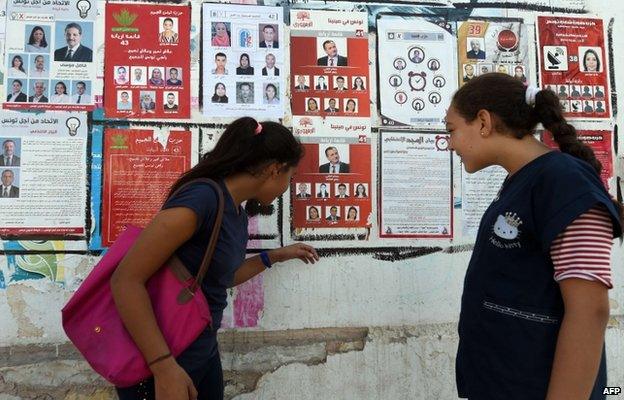
Some five million Tunisians have registered to vote in the upcoming elections
Tunisians vote on 26 October in a parliamentary election, which they hope will see the end of a nearly-four year transition period which followed the ousting of President Zine al-Abidine Ben Ali in 2011.
The "cradle of the Arab Spring" will this time see officials of the former government taking part in the election, prompting interim President Moncef Marzouki to call it a contest between "supporters of the revolution and supporters of the counter-revolution".

How does the electoral system work?
The system is based on proportional representation, with each of the country's regions having a fixed number of seats based on population.
Lists of candidates are drawn up by parties, coalitions and independents and endorsed by the overseeing body, the Independent High Authority for Elections (ISIE).
Some five million Tunisians have registered to vote. Candidates must be aged 23 or over and have held Tunisian nationality for at least 10 years.

Are women's rights being respected?
According to ISIE, 49% of newly-registered voters are women. And the 26 January 2014 constitution introduced - for the first time in the Arab world - parity between men and women in elections.
The law stipulates that women should comprise 50% of all electoral lists and there must be an equal number of lists headed by women and men.
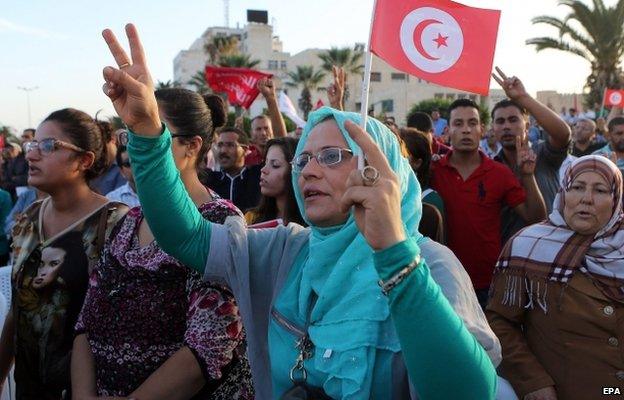
Some 49% of newly-registered voters are women

Who is likely to win?
Tunisia's election process means that no party is likely to win a majority of seats in the renamed National Assembly. However, political observers agree - in the absence of opinion polls, which are banned during the campaign - that the favourites are the Islamist Ennahda Movement and their secular opponents, the liberal Nidaa Tounes (Tunisia's Call).
A number of other parties are in contention, including the centre-ground secular Congress for the Republic (CPR) and secular Democratic Forum for Labour and Liberty (FDTL or Ettakatol) and those led by former officials of Ben Ali's regime.
Most candidates claim to have the economy at the heart of their campaign, realising that poverty and unemployment were the main factors that triggered the 14 January revolution in 2011.
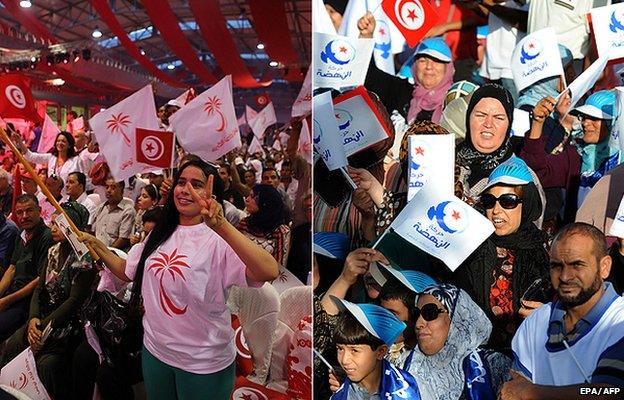
Supporters of two most popular parties: liberal Nidaa Tounes (L) and Islamist Ennahda Movement (R)

Which are the main parties, groups?
Ennahda won 89 of 217 seats in 2011 and led a coalition government with CPR and FDTL. It lost power in January following street protests but hopes to make a comeback. It has said it is willing to form a coalition with any other party.
Nidaa Tounes wants to rally nationalist and liberal supporters to weaken the position of Ennahda. It was founded by Beji Caid Essebsi, a former transitional prime minister, and enjoys the support of the Tunisian General Labour Union and some business groups. Nidaa says it will not contemplate any coalition with Ennahda until that groups "clarifies" its relationship with the Muslim Brotherhood across the Middle East and North Africa.
Congress for the Republic (CPR) is led by interim President Marzouki and won 29 seats in 2011.
Democratic Forum for Labour and Liberties was founded in 1994 by National Constituent Assembly Speaker Mustapha Ben Djaafar. It won 20 seats in 2011.
Popular Front is a coalition of five left-wing and Baathist parties led by Hamma Hammami. It played an important role in mobilising street protests to bring down two Ennahda-led governments. The Front parties, however, do not seem to have significant electoral support.
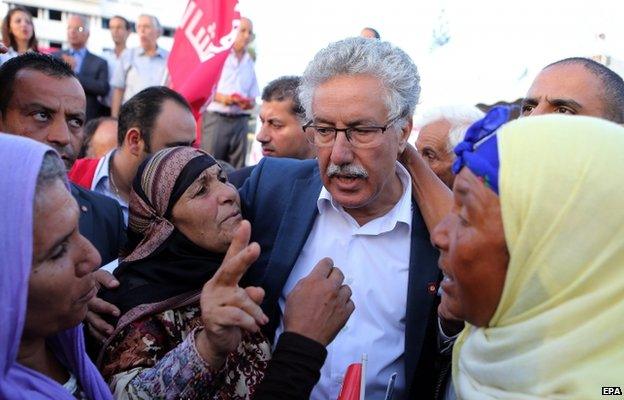
Hamma Hammami (C) with supporters of Popular Front party

Will armed Islamists disrupt election?
The al-Qaeda-affiliated Okba Ibn Nafaa battalion, active on Tunisia's border with Algeria, has threatened to disrupt the election.
Interior Minister Lotfi Ben Jeddou has said his ministry has plans in hand to deal with the "terrorist" threat, which he described as "serious". Tunisia is to mobilize 50,000 security officers and nearly 20,000 soldiers to secure the election.

How did the campaigning go?
Tunisians have shown only "lukewarm interest", according to al-Jazeera TV on 20 October. Tunisian academic Abdellatif Hanachi told al-Jazeera that this is partly because of the difficult economic and social conditions in the country.
He added that voter apathy was due to a "sense of frustration" among a broad section of people at the failure to fulfil revolutionary promises. However, he concluded that this could all change on polling day, as it did in 2011.
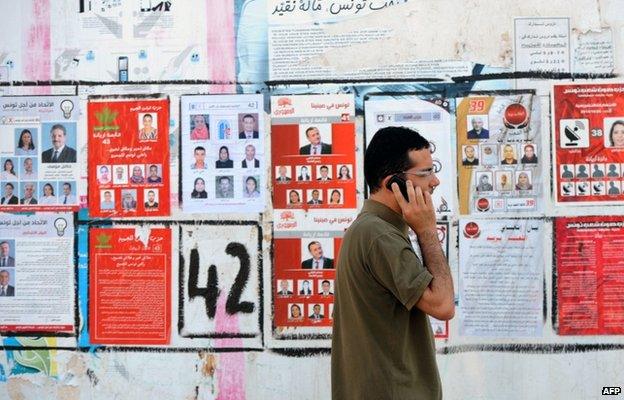
Media note only "lukewarm interest" for the election by the public
BBC Monitoring reports and analyses news from TV, radio, web and print media around the world. For more reports from BBC Monitoring, click here. You can follow BBC Monitoring on Twitter, external and Facebook, external.